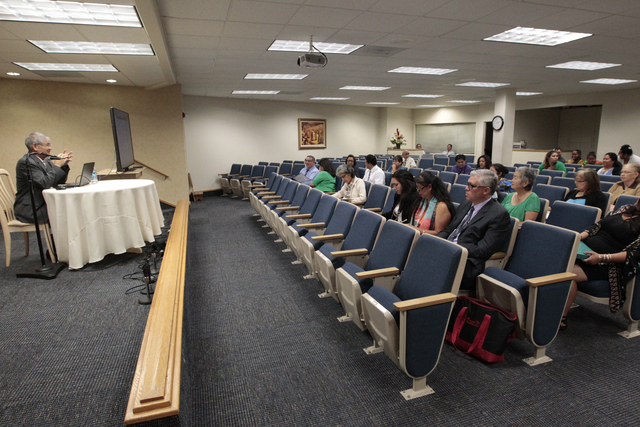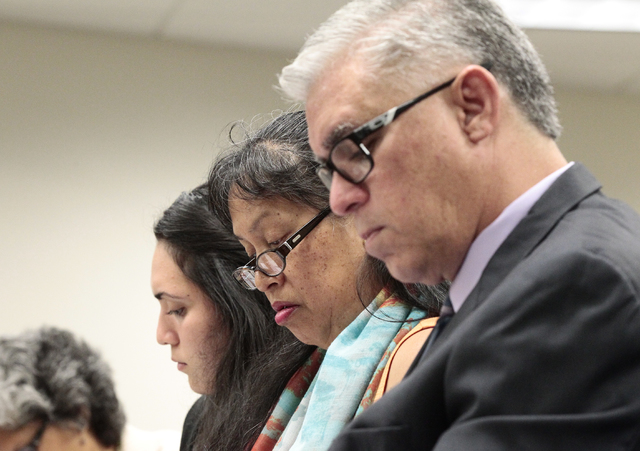The new word

JAMM AQUINO / JAQUINO@STARADVERTISER.COM
William Kupau, right, sat with his wife, Ilima, and daughter Alana, 19, in a Chuukese language class June 25 at the Jehovah’s Witness Kingdom Hall in Kalihi. “It’s a challenge, but I’m doing the best I can,” William said.

JAMM AQUINO / JAQUINO@STARADVERTISER.COM
“There’s a need, and we want to reach people with the Bible’s message. It’s a challenge, but I’m doing the best I can.”
William Kupau
With his wife, Ilima, and daughter Alana, left, during a Chuukese-language class June 25 at the Jehovah’s Witnesses kingdom hall in Kalihi; the instructor was Rodney Ajimine, top.


When William Kupau was asked to learn the Chuukese language to better share the gospel with immigrants who barely spoke English, he had his doubts.
The longtime Jehovah’s Witness, who lives in Kapolei, recalls that his reaction to the request started with a question. “A foreign language at my age? I’m 58 years old; I’m still learning English!”
Kupau — along with wife Ilima, 19-year-old daughter Alana and 23 other Jehovah’s Witnesses — is taking Chuukese-language classes at the kingdom hall on Kamehameha IV Road in Kalihi, where the only Chuukese congregation in the state meets.
“There’s a need, and we want to reach people with the Bible’s message. It’s a challenge, but I’m doing the best I can,” Kupau said.
Bruce H. Wakuzawa, a Jehovah’s Witnesses spokesman, said other Jehovah members are taking classes to learn American Sign Language, Japanese, Ilocano, Korean and other ethnic tongues as part of a worldwide movement to share the faith’s beliefs with “every nation and tribe and tongue,” referencing Revelations 14:6.
At the ongoing annual Jehovah’s Witnesses regional convention, which started June 17, each meeting is held in English and/or a different language. The sessions are free and open to the public, 9:20 a.m. to 5 p.m. on weekends until Aug. 21 at the Mililani Assembly Hall of Jehovah’s Witnesses at 239 Palii St.
Don't miss out on what's happening!
Stay in touch with breaking news, as it happens, conveniently in your email inbox. It's FREE!
Here’s the schedule: this weekend, Korean; July 8-10, Spanish language only; July 15-17, Ilocano only; July 22-24, Tagalog; July 29- 31, Mandarin Chinese; Aug. 5-7, American Sign Language available on most videos, and an ASL interpreter will also be present; Aug. 12-14, Chuukese; Aug. 19-21, Marshallese; and Aug. 27-28, Samoan only.
“Our various publications are offered in a combined total of more than 750 languages, including 80 sign languages. We make a strenuous effort to translate our publications because we believe that every individual is important and should have access to the Bible’s positive message,” including magazines Awake! and The Watchtower, Wakuzawa said.
Regarding the estimated 10,000 residents from Chuuk, Micronesia, in Hawaii, Wakuzawa said, “Many Chuukese come from broken or single-parent homes, and some of the youths have difficulties in making adjustments to life in Hawaii.” He added, “Bible principles can help these youths to build self-esteem and to learn principles to avoid the pitfalls.”
Rodney Ajimine and Wayne Kikuchi, Hawaii residents who long served as missionaries to Chuuk, are teaching the Chuukese-language class over a four-month period.
Even though Kupau has completed just one month of lessons so far, he said whenever he has attempted to speak the language, the Chuukese have responded with “a great appreciation — there are big smiles on their faces. It’s very rewarding. We can see we’re reaching them.”
He said his efforts strike the Chuukese as unexpected and amusing because he’s a part-Hawaiian “guy who’s 6-foot-1 and fair-looking” (fair-skinned). “They just light up! They get really excited. So we’re having nice results and conversations.”



